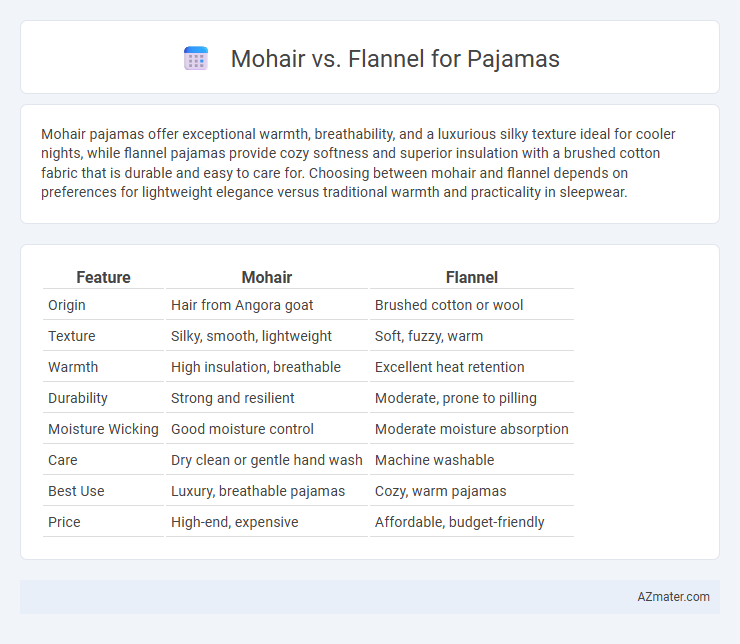Mohair pajamas offer exceptional warmth, breathability, and a luxurious silky texture ideal for cooler nights, while flannel pajamas provide cozy softness and superior insulation with a brushed cotton fabric that is durable and easy to care for. Choosing between mohair and flannel depends on preferences for lightweight elegance versus traditional warmth and practicality in sleepwear.
Table of Comparison
| Feature | Mohair | Flannel |
|---|---|---|
| Origin | Hair from Angora goat | Brushed cotton or wool |
| Texture | Silky, smooth, lightweight | Soft, fuzzy, warm |
| Warmth | High insulation, breathable | Excellent heat retention |
| Durability | Strong and resilient | Moderate, prone to pilling |
| Moisture Wicking | Good moisture control | Moderate moisture absorption |
| Care | Dry clean or gentle hand wash | Machine washable |
| Best Use | Luxury, breathable pajamas | Cozy, warm pajamas |
| Price | High-end, expensive | Affordable, budget-friendly |
Introduction: Mohair vs Flannel Pajamas
Mohair pajamas offer exceptional warmth and a silky texture derived from the angora goat's luxurious fibers, making them highly breathable and moisture-wicking. Flannel pajamas, crafted from brushed cotton or wool, provide a soft, cozy feel with superior insulation and durability for colder climates. Choosing between mohair and flannel pajamas depends on preferences for warmth, softness, and fabric breathability in sleepwear.
What is Mohair? Key Characteristics
Mohair is a luxurious fiber obtained from the Angora goat, known for its exceptional sheen, softness, and durability. It offers excellent insulation, moisture-wicking properties, and natural elasticity, making it highly breathable and comfortable for pajamas. Compared to flannel, mohair provides a lighter, smoother texture with superior temperature regulation, ideal for both warm and cool climates.
What is Flannel? Key Characteristics
Flannel is a soft, woven fabric typically made from cotton, wool, or synthetic fibers, known for its warmth and comfort. It features a napped, brushed surface that enhances insulation by trapping heat, making it ideal for cold-weather pajamas. The texture of flannel provides a cozy, breathable, and moisture-wicking quality, distinguishing it from smoother fabrics like mohair.
Comfort Comparison: Mohair vs Flannel
Mohair pajamas provide superior breathability and temperature regulation due to their natural protein fibers, making them exceptionally comfortable in both warm and cool environments. Flannel offers a soft, brushed texture that retains warmth effectively, ideal for colder climates but may feel less breathable than mohair. The choice between mohair and flannel depends on personal comfort preferences related to heat retention and moisture-wicking capabilities.
Warmth and Insulation Properties
Mohair offers superior warmth and insulation due to its natural ability to trap heat and regulate moisture, making it ideal for cold nights. Flannel provides excellent warmth through its dense, brushed cotton fibers that create a soft, insulating layer by trapping body heat. While mohair excels in temperature regulation and breathability, flannel is valued for its consistent warmth and cozy feel in cooler climates.
Breathability and Moisture Management
Mohair excels in breathability due to its natural fibers that allow superior air circulation, making it ideal for regulating body temperature in pajamas. Flannel, typically made from cotton or wool, offers moderate moisture management but tends to retain heat and absorb moisture rather than wick it away. Choosing mohair pajamas enhances moisture-wicking capabilities and airflow, providing a cooler, drier sleep experience compared to the warmer, heavier feel of flannel.
Durability and Longevity
Mohair pajamas offer exceptional durability due to the fiber's natural strength and resistance to wear, making them ideal for long-term use. Flannel pajamas, while soft and cozy, tend to show signs of pilling and thinning over time with frequent washing. Choosing mohair enhances longevity and maintains fabric integrity longer compared to flannel, which may degrade faster under regular use.
Ease of Care and Maintenance
Mohair pajamas require delicate care, often needing dry cleaning or gentle hand washing to maintain fiber integrity and softness, making them less convenient for everyday use. Flannel pajamas offer superior ease of care, as they are machine washable and durable, retaining warmth and softness after multiple washes without special treatment. Choosing flannel ensures low-maintenance comfort ideal for frequent wear, while mohair demands more careful upkeep to preserve its luxurious texture.
Style and Appearance Differences
Mohair pajamas feature a luxurious sheen and a smooth, silky texture that exudes elegance and sophistication, often chosen for a polished nighttime look. Flannel pajamas present a matte finish with a soft, fuzzy surface, emphasizing comfort and a cozy, casual style ideal for colder months. The distinct fiber structures result in mohair's sleek, lightweight drape contrasting with flannel's warm, textured, and more relaxed silhouette.
Which is Better for Pajamas: Mohair or Flannel?
Mohair fabric, known for its silk-like sheen, durability, and excellent breathability, offers lightweight warmth and moisture-wicking properties ideal for comfortable pajamas. Flannel, woven from soft cotton or wool, provides superior insulation and a cozy, plush feel, making it perfect for colder climates and those seeking extra warmth. For pajamas, flannel is typically better suited for cold weather due to its heat retention, while mohair excels in mild or variable temperatures by balancing warmth with breathability.

Infographic: Mohair vs Flannel for Pajama
 azmater.com
azmater.com